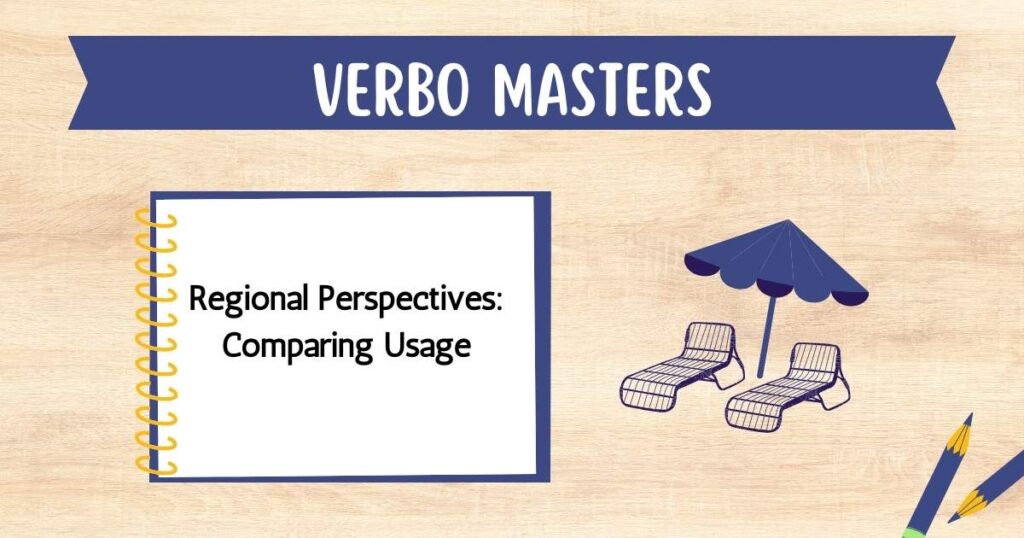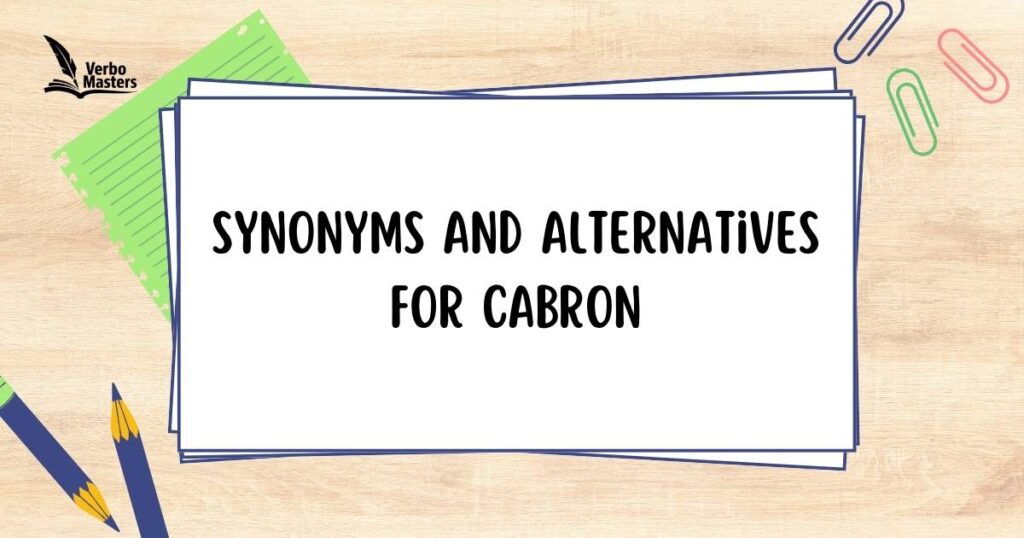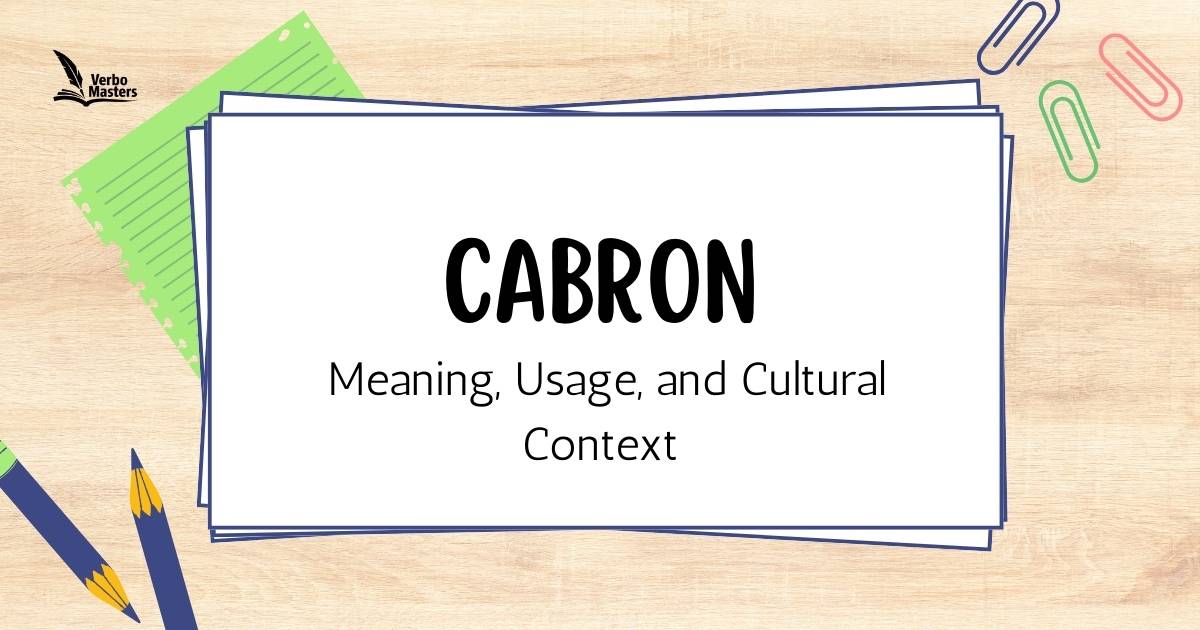The word cabron is a Spanish slang term with multiple meanings that shift depending on context. It can be used as an insult, a compliment, or even an expression of surprise. In some regions, it refers to someone seen as a tough or clever individual, while in others, it carries a more offensive or disrespectful tone.
Cabron is often used casually among friends in informal conversations, where it might be taken as playful or humorous. However, when used in the wrong setting or with the wrong tone, it can come across as rude or insulting. The meaning largely depends on regional culture, the relationship between speakers, and how it’s said. Being aware of these nuances is important to use the word appropriately and avoid misunderstandings.
What Does Cabron Mean?
The word cabron is a widely used Spanish slang term with a range of meanings that depend heavily on tone, context, and regional usage. It can be playful, insulting, or even complimentary. In friendly conversations among close peers, it might be used to tease or praise someone for being clever, daring, or bold.
However, in other situations, cabron can carry a much more negative meaning, referring to someone seen as dishonest, rude, or morally questionable. In some Spanish-speaking countries, it may imply someone is a cheater or unfaithful partner. Because of its versatility and potential to offend, it’s important to understand the cultural context and relationship between speakers before using this term.
25 Key Facts About “Cabron”
1. “Cabron” is a slang word used in many Spanish-speaking countries.
2. It can be an insult or a friendly term, depending on context.
3. In Mexico, it is often used informally among friends.
4. In Spain, it is considered a stronger insult.
5. The feminine version of “cabron” is “cabrona.”
6. It can mean “bastard,” “jerk,” or “cheater” when used negatively.
7. Some people use it to mean “badass” or “tough guy.”
8. The meaning depends heavily on tone and body language.
9. “Cabron” can also mean someone is very smart or clever.
10. In Puerto Rico, it can be both an insult and a compliment.
11. It is commonly heard in Latin music and movies.
12. The word has been around for centuries.
13. In some cases, it refers to someone who has been cheated on.
14. It is often used in street slang and informal speech.
15. Among friends, it can mean “bro” or “dude.”
16. In some contexts, it expresses disbelief, like saying “No way!”
17. Some cultures find it highly offensive, while others use it casually.
18. “No seas cabron” means “Don’t be a jerk.”
19. In business, it can mean someone who is very skilled or ruthless.
20. In the Dominican Republic, it can mean someone is powerful.
21. Tone is everything—saying it wrong can lead to trouble.
22. Some people use it jokingly, while others take it seriously.
23. It is one of the most flexible slang words in Spanish.
24. Many people use it without thinking about its deeper meaning.
25. Knowing when to use “cabron” correctly is key to avoiding misunderstandings.
Common Uses and Examples
The word cabron is highly flexible in Spanish and can shift meaning based on how and where it’s used. It can range from light-hearted teasing to serious insult, making it important to understand the tone, intent, and cultural setting. Below are some common examples of how cabron appears in everyday conversations:
25 Ways “Cabron” Is Used in Sentences
1. “Ese cabrón me engañó.” (That bastard cheated me.)
2. “No seas cabrón con tu hermana.” (Don’t be mean to your sister.)
3. “Eres un cabrón para los negocios.” (You’re a business genius.)
4. “Ese cabrón juega increíblemente bien.” (That guy plays incredibly well.)
5. “Nos vemos luego, cabrón.” (See you later, dude.)
6. “¡Qué cabrón!” (What a jerk!)
7. “Mi jefe es un cabrón.” (My boss is a tough guy.)
8. “Ese cabrón siempre tiene suerte.” (That guy is always lucky.)
9. “No seas cabrón, ayúdame.” (Don’t be harsh, help me.)
10. “La cabrona de la vecina no deja de molestar.” (The annoying neighbor won’t stop bothering us.)
11. “Ese cabrón nunca pierde una apuesta.” (That guy never loses a bet.)
12. “¡Qué cabrón! No me lo esperaba.” (Wow, I didn’t expect that!)
13. “Ella es una cabrona en los negocios.” (She is a boss in business.)
14. “Cabrón, no te olvides de la reunión.” (Dude, don’t forget the meeting.)
15. “Ese cabrón es mi mejor amigo.” (That guy is my best friend.)
16. “Oye cabrón, ¿cómo estás?” (Hey dude, how are you?)
17. “Se ve cabrón, pero es buena persona.” (He looks rough, but he’s a good person.)
18. “Ese cabrón es muy terco.” (That guy is very stubborn.)
19. “¡Qué cabrón eres para los videojuegos!” (You’re amazing at video games!)
20. “No me hables así, cabrón.” (Don’t talk to me like that, dude.)
21. “Ese examen estuvo cabrón.” (That test was really hard.)
22. “Voy a salir con mis cabrones hoy.” (I’m going out with my buddies today.)
23. “No seas cabrón, comparte la comida.” (Don’t be greedy, share the food.)
24. “Siempre actúa como un cabrón, pero tiene buen corazón.” (He always acts tough, but he has a good heart.)
25. “Ese cabrón me enseñó todo lo que sé.” (That guy taught me everything I know.)
The Different Meanings of Cabron
Cabron is one of the most flexible and commonly used slang words in the Spanish language. Its meaning can shift dramatically depending on tone, location, and the relationship between speakers. In some settings, it’s used to insult someone by calling them rude, dishonest, or untrustworthy. In others, it can be a playful jab between friends or even a compliment for someone who is clever, daring, or impressively skilled.
Because cabron can carry both positive and negative connotations, its use requires cultural awareness. In informal conversations among close friends, it might come off as humorous or affectionate. However, in formal situations or with unfamiliar people, it can easily be taken as offensive. Knowing when and how to use the word is key to communicating effectively without causing misunderstandings.
25 Different Meanings of “Cabron”
1. In Spain, it is often used as a strong insult.
2. In Mexico, it can mean “dude” or “bro” among friends.
3. Some use it to mean “tough guy” or “badass.”
4. In Puerto Rico, it can be both a compliment and an insult.
5. It sometimes means someone is very clever or sneaky.
6. It can be used to show frustration with someone’s actions.
7. In some regions, it refers to a man who has been cheated on.
8. Among close friends, it can mean “cool guy.”
9. It can describe someone as bold or fearless.
10. It can mean someone is always getting their way.
11. “Cabrona” is the feminine version, often used for women.
12. In business, it can describe someone as ruthless or smart.
13. It is frequently heard in reggaeton and rap music.
14. In some cultures, it is considered highly offensive.
15. It can be used to describe someone who never gives up.
16. Sometimes, it’s just a way to greet a friend.
17. In slang, it can mean someone is very skilled at something.
18. It can express disbelief, similar to saying “No way!”
19. “Ese cabrón siempre gana” means “That guy always wins.”
20. “No seas cabrón” is used to tell someone to stop being mean.
21. It can also mean someone is very stubborn.
22. Some people use it as a joking insult among friends.
23. In everyday speech, it is often used without offense.
24. It’s important to know the cultural context before using it.
25. The tone and relationship between speakers define its meaning.
You can also read; Abbreviation for Kindergarten? Definition & Meaning
How to Use Cabron in a Sentence
The word cabron can be tricky because its meaning changes depending on the tone, setting, and relationship between speakers. It can be lighthearted and humorous among close friends, but the same word can come across as rude or offensive in a different context.
To use cabron correctly, it’s important to pay attention to who you’re talking to and how it’s being said. What’s playful in one country or group might be insulting in another. Being aware of regional slang and social dynamics can help you avoid misunderstandings and ensure the word is received in the way you intend.
25 Ways to Use “Cabron” in a Sentence
1. Use it casually among friends: “¿Qué onda, cabrón?” (What’s up, dude?)
2. Express frustration: “¡No seas cabrón!” (Don’t be a jerk!)
3. Show admiration: “Eres un cabrón en los negocios.” (You’re a genius in business.)
4. Describe someone tough: “Ese tipo es muy cabrón.” (That guy is really strong.)
5. Joke with a friend: “Eres un cabrón, siempre ganas.” (You’re a lucky guy, you always win.)
6. Warn someone: “No te metas con ese cabrón.” (Don’t mess with that guy.)
7. Use it in disbelief: “¡Qué cabrón!” (No way!)
8. Complain about someone: “Ese cabrón me engañó.” (That jerk tricked me.)
9. Playfully tease: “Mira a este cabrón, llegando tarde otra vez.” (Look at this guy, late again.)
10. Talk about a strong woman: “Esa cabrona no se rinde.” (That woman never gives up.)
11. Express amazement: “¡Qué cabrón está ese coche!” (That car is amazing!)
12. Encourage someone: “¡Vamos, cabrón, tú puedes!” (Come on, dude, you can do it!)
13. Describe something difficult: “Ese examen estuvo cabrón.” (That test was really hard.)
14. Say someone is sneaky: “Ese cabrón siempre encuentra la manera.” (That guy always finds a way.)
15. Express anger: “¡Pinche cabrón!” (Damn bastard!)
16. Show respect: “Mi abuelo era un cabrón.” (My grandfather was a tough man.)
17. In a warning: “No confíes en ese cabrón.” (Don’t trust that guy.)
18. Use it playfully: “¡Ay, cabrón, qué chistoso eres!” (Oh, dude, you’re so funny!)
19. Describe a great skill: “Juega fútbol como un cabrón.” (He plays soccer like a pro.)
20. Express surprise: “¿De verdad? ¡No manches, cabrón!” (Really? No way, dude!)
21. Say someone is intimidating: “Ese cabrón da miedo.” (That guy is scary.)
22. In a compliment: “Esa cabrona sabe lo que hace.” (That woman knows what she’s doing.)
23. Express annoyance: “Ese cabrón nunca contesta.” (That guy never answers.)
24. Talk about a challenge: “Terminar el trabajo fue cabrón.” (Finishing the job was really hard.)
25. Use it in a farewell: “Nos vemos, cabrón.” (See you later, dude.)
Historical Evolution of Cabron
The word cabron has a long history in the Spanish language and has evolved significantly over time. Its original meaning was quite literal it referred to a male goat. This association with goats eventually gave rise to figurative uses, some of which were tied to negative traits like stubbornness or unruliness.
Over the centuries, cabron transitioned into a slang term with a wide range of meanings. In some regions, it came to describe someone being cheated on (especially in reference to a man whose partner is unfaithful), while in others, it began to carry more general meanings like clever, bold, tough, or even jerk, depending on the context and tone. Today, its versatility makes it a common yet complex part of informal Spanish, with meanings that continue to shift across cultures and generations.
25 Facts About the History of “Cabron”
1. The word comes from the Spanish “cabra”, which means “goat.”
2. Originally, “cabron” meant a big male goat.
3. Over time, people started using it as slang.
4. In medieval Spain, it was used as an insult for unfaithful husbands.
5. It became a popular slang term in Latin America.
6. In the 19th century, it was mainly an insult.
7. Over time, it started being used in a more playful way.
8. Many cultures have changed its meaning slightly.
9. In some places, it is still considered a strong insult.
10. In Mexico, it is now used in both good and bad ways.
11. It appears in a lot of Latin American music and films.
12. The word is commonly used in informal conversations.
13. It has influenced other slang words in Spanish.
14. Some people use it without realizing its original meaning.
15. The feminine version, “cabrona”, developed later.
16. Some dictionaries define it as vulgar language.
17. Despite being slang, it is widely understood in Spanish-speaking countries.
18. The word’s meaning depends on the culture using it.
19. Many people now use it as a friendly term.
20. In Spain, it remains more offensive than in Latin America.
21. Some people consider it part of everyday speech.
22. It continues to evolve and take on new meanings.
23. Context is key—its meaning changes depending on the situation.
24. The rise of social media has made it even more popular.
25. Despite its history, “cabron” is still one of the most used slang words in Spanish.
Regional Perspectives: Comparing Usage

The meaning of cabron changes depending on the country and culture. While some places use it casually among friends, others see it as a strong insult. Understanding these differences helps avoid misunderstandings.
25 Ways “Cabron” is Used in Different Regions
1. In Mexico, “cabron” can mean “dude,” “tough guy,” or “jerk,” depending on the tone.
2. In Spain, it is considered a strong insult, meaning “bastard” or “idiot.”
3. Puerto Rico uses it for both insults and friendly teasing.
4. In Argentina, it’s rarely used and is considered rude.
5. In Colombia, it can mean someone is clever or sneaky.
6. In Venezuela, it refers to someone who is aggressive or dominant.
7. In Cuba, “cabron” is sometimes used like “bro” but can also be offensive.
8. Dominican Republic uses it similarly to “badass” or “strong person.”
9. In Peru, it can mean “cheater” or “mean person.”
10. In Ecuador, it’s not very common and is considered vulgar.
11. Chile uses it more playfully among close friends.
12. In Guatemala, it can mean “tough guy” or “a smart person.”
13. Bolivia rarely uses “cabron,” but when it does, it’s an insult.
14. In Honduras, it can mean “someone with bad intentions.”
15. Nicaragua uses it similarly to “badass” or “ruthless person.”
16. In El Salvador, it can mean “jerk” or “ruthless person.”
17. Paraguay considers it offensive and rarely uses it.
18. In Uruguay, it is mostly used in insults.
19. Some US Spanish speakers use it casually, depending on their heritage.
20. In Spain, “cabron” is stronger than in most Latin American countries.
21. Telenovelas often use “cabron” to describe villains.
22. In music, it is sometimes used to describe a strong or confident person.
23. Some reggaeton lyrics use it to mean “powerful” or “dominant.”
24. Among young people, it is more acceptable than with older generations.
25. Tone and context are the most important factors in how it’s understood.
Cultural Context: Sociolinguistic Commentary
Cabron is more than just a word—it reflects cultural attitudes, relationships, and even humor. In some places, it is a normal part of daily speech, while in others, it is offensive. Understanding its cultural context helps use it appropriately.
25 Cultural Aspects of “Cabron”
1. In Mexico, its meaning depends on who says it and how they say it.
2. In Spain, it is almost always considered an insult.
3. Many Latin American countries use it casually among friends.
4. Older generations often see it as rude or disrespectful.
5. Younger people use it more freely, especially in urban areas.
6. It appears in music, movies, and TV shows across Latin America.
7. In some cultures, it shows confidence or dominance.
8. In others, it suggests rudeness or aggression.
9. Some people avoid using it in formal settings.
10. It is common in working-class communities but less so in business settings.
11. In Mexico, it can be a compliment if said with a friendly tone.
12. It is often used in sports culture to describe tough athletes.
13. In Puerto Rico and the Dominican Republic, it’s often playful.
14. Women using “cabron” or “cabrona” has become more accepted in some places.
15. In some regions, it’s considered a strong curse word.
16. In casual conversation, it can express surprise or admiration.
17. Some cultures use it to describe rebellious or independent people.
18. It is popular in internet memes and social media.
19. Some people reclaim it as a term of power.
20. In business, it can mean someone is ruthless and strategic.
21. In relationships, it can describe someone who is unfaithful or dishonest.
22. In hip-hop and reggaeton, it is often used as a term of respect.
23. Some communities consider it too vulgar for everyday speech.
24. It is often said with a laugh or a smile to soften its meaning.
25. Learning its cultural context can help avoid misunderstandings and offense.
Gendered Perspectives: Cabron vs. Cabrona
The words cabron and cabrona share the same root but carry different connotations, especially when it comes to gender and cultural context. Cabron is widely used in both positive and negative ways it can mean someone is clever, bold, or impressive, but it can also be used as an insult, depending on how and where it’s said.
Cabrona, the feminine form, tends to be more controversial. In some cultures and communities, it’s seen as empowering, used to describe a strong, fearless, or assertive woman who doesn’t let others walk over her. In other contexts, however, it can be viewed as offensive or degrading, often associated with disrespect or aggression. The meaning of both words relies heavily on tone, the relationship between speakers, and regional attitudes toward slang and gender roles.
25 Differences Between “Cabron” and “Cabrona”
1. “Cabron” is mostly used for men, while “cabrona” is for women.
2. “Cabron” can mean tough, smart, or sneaky.
3. “Cabrona” can mean strong, fearless, or rude.
4. In Mexico, “cabrona” is sometimes used as a compliment for independent women.
5. In Spain, “cabrona” is usually more insulting than “cabron.”
6. In music and pop culture, “cabrona” is often used in a powerful way.
7. Some women embrace “cabrona” as a sign of strength.
8. Older generations tend to see “cabrona” as a bad word.
9. “Cabron” is commonly used among male friends.
10. “Cabrona” is less commonly used among female friends.
11. “Cabron” can mean someone is successful in business.
12. “Cabrona” can mean a woman who gets what she wants.
13. Some people see “cabrona” as more offensive than “cabron.”
14. The tone of voice matters “cabrona” can sound playful or harsh.
15. “Cabron” can mean someone is unfaithful in a relationship.
16. “Cabrona” can also mean a woman who plays with emotions.
17. In some cultures, “cabrona” is seen as an insult to a woman’s character.
18. Some feminists reclaim “cabrona” as a word of empowerment.
19. “Cabron” can mean a man is dominant or fearless.
20. “Cabrona” can mean a woman is confident and doesn’t take nonsense.
21. Some people avoid using “cabrona” because it can sound harsh.
22. In casual conversation, “cabron” is much more common.
23. The meaning of “cabrona” depends a lot on the relationship between speakers.
24. Younger people use “cabrona” more freely than older generations.
25. Whether “cabrona” is good or bad depends on the culture, tone, and situation.
Synonyms and Alternatives for Cabron

If you want to use a word similar to cabron , but in a less intense or more polite way, there are many options. Some synonyms have a softer meaning, while others carry the same strength but in a different style.
25 Words Similar to “Cabron”
1. Cabrón (formal) – Still the same word, but used carefully.
2. Compa – A friendly term meaning “buddy” or “pal.”
3. Carnal – A Mexican slang word for “brother” or “friend.”
4. Güey – A casual way to say “dude” in Mexico.
5. Vato – A cool way to say “guy” or “dude” in some Spanish-speaking countries.
6. Chingón – A strong word meaning “awesome” or “badass.”
7. Tramposo – If you mean “cabron” as a cheater or sneaky person.
8. Pillo – A playful way to say someone is mischievous.
9. Mañoso – A word for someone who is tricky or skilled at getting their way.
10. Desgraciado – A strong insult meaning “scoundrel” or “bastard.”
11. Malandro – A slang term for someone who is a troublemaker.
12. Listo – A neutral way to say someone is smart or clever.
13. Fregón – A positive way to say someone is skilled or hardworking.
14. Jefe – A respectful way to refer to a strong leader or boss.
15. Pesado – Can mean someone is serious or a big deal.
16. Chismoso – If you mean “cabron” as someone who gossips too much.
17. Astuto – A more neutral word for someone who is smart and strategic.
18. Macho – Can mean someone is strong or manly, but has different cultural meanings.
19. Hábil – A word for someone who is talented or skillful.
20. Ganador – If you mean “cabron” as a winner or someone who succeeds.
21. Lobo – A way to describe a man who is independent and smart.
22. Diablo – A strong word meaning “devil,” but used playfully in some cases.
23. Caballero – A respectful way to refer to a man instead of using slang.
24. Tigre – In some places, this means someone is brave or clever.
25. Rey – If you want to give someone a compliment, calling them “king” works well.
Who Uses Cabron?
The word cabron is used by many different people, but its meaning depends on the person, the situation, and the culture. Some people use it casually, while others find it offensive. Understanding who uses it and why can help avoid misunderstandings.
25 Groups of People Who Use “Cabron”
1. Friends use it playfully, like saying “dude” or “bro.”
2. Teens and young adults use it in casual conversations.
3. Men often use it more than women.
4. Older generations may see it as disrespectful.
5. Mexican speakers use it frequently in everyday speech.
6. Puerto Ricans use it as both an insult and a compliment.
7. Spanish speakers in the U.S. often mix it with English slang.
8. Musicians and rappers use it in song lyrics.
9. Comedians use it for jokes and storytelling.
10. Athletes and sports fans use it to hype each other up.
11. People in tough neighborhoods use it as a sign of strength.
12. Workers in casual jobs might use it to talk to coworkers.
13. People in arguments use it to express frustration.
14. Street vendors and taxi drivers sometimes say it jokingly.
15. Barbers and hairstylists may use it with customers they know well.
16. Family members use it in a playful or scolding way.
17. Gamers use it online when playing video games.
18. People from Spain use it differently than Latin Americans.
19. Social media users comment with it in memes and jokes.
20. Reggaeton artists use it as a cool or rebellious word.
21. People in relationships may say it when arguing.
22. Actors in movies use it in dramatic or comedic roles.
23. Some professionals use it outside of work but not in the office.
24. Stand-up comedians say it for humor and exaggeration.
25. People traveling to Spanish-speaking countries might hear it often.
When to Use (and When Not to Use)
Cabron can be useful in conversation, but using it at the wrong time or place can cause problems. Knowing when it’s acceptable and when to avoid it is important to keep things friendly and respectful.
25 Situations for Using or Avoiding “Cabron”
✅ When to Use It:
1. Among close friends who understand the meaning.
2. In casual conversations with people who also use slang.
3. When joking with someone who knows you’re not serious.
4. In music or creative works where slang is common.
5. When expressing admiration in some cultures.
6. In playful trash talk during sports or gaming.
7. In informal settings like bars or parties.
8. When repeating something from a movie or show.
9. When emphasizing strong emotions (anger, surprise, or excitement).
10. In memes and internet jokes where the tone is clear.
🚫 When NOT to Use It:
11. In formal or professional settings like work or school.
12. When talking to elders or people you don’t know well.
13. In official emails, business meetings, or customer service.
14. In front of children or in polite company.
15. When meeting new people who might not understand slang.
16. In serious discussions where respect is needed.
17. With people from cultures where it’s considered highly offensive.
18. When you’re unsure of how the other person will react.
19. In legal situations or professional environments.
20. When speaking to someone in a position of authority.
21. When traveling, unless you know how locals use it.
22. When trying to make a good first impression.
23. In social media comments where tone can be misunderstood.
24. In romantic situations where it might sound disrespectful.
25. When talking to someone sensitive to strong language.
Why Cabron is More Than Just a Word
Cabron is more than just slang it carries deep cultural meaning and varies by region, tone, and situation. It can be playful, insulting, or even a sign of respect. Understanding the word fully helps you use it correctly and avoid misunderstandings.
25 Reasons “Cabron” is More Than Just a Word
1. It can mean different things depending on tone.
2. It’s used both as an insult and as a compliment.
3. It has a long history in Spanish-speaking cultures.
4. Some people use it daily, while others find it offensive.
5. It appears in movies, music, and TV shows.
6. The meaning changes between Latin America and Spain.
7. Friends often say it jokingly.
8. It can express frustration, admiration, or disbelief.
9. It’s one of the most commonly used Spanish slang words.
10. It helps add personality to conversations.
11. Some cultures use it more casually than others.
12. In some places, using it incorrectly can cause problems.
13. It has different meanings for men and women.
14. Social media and memes have popularized it even more.
15. It has evolved in meaning over time.
16. It can reflect power and confidence in certain contexts.
17. Some people reclaim it as a word of strength.
18. It’s often heard in street slang and informal speech.
19. People use it to emphasize strong emotions.
20. The word has many synonyms, both strong and soft.
21. It’s commonly used in Latin music lyrics.
22. It’s part of everyday speech in many Spanish-speaking countries.
23. Knowing when and how to use it shows cultural understanding.
24. The meaning depends on the relationship between speakers.
25. It’s a word that carries history, personality, and cultural weight.
FAQs
What does cabron mean?
“Cabron” is a Spanish slang word that can mean anything from “dude” to “jerk” depending on the tone and context. It can be used playfully or as an insult.
Is “cabron” a bad word?
It depends on how and where it’s used. In some cases, it’s harmless slang, but in others, it can be offensive.
Can women use the word “cabron”?
Yes, but they often use “cabrona” instead, which is the feminine form. However, both words can carry different meanings based on the situation.
What countries use “cabron” the most?
It is commonly used in Mexico, Spain, Puerto Rico, and other Latin American countries, though the meaning can vary.
How do you pronounce “cabron”?
It’s pronounced as “kah-BROHN,” with a strong emphasis on the last syllable.
Can “cabron” be a compliment?
Yes, in some cases, it can mean someone is tough, smart, or skilled. However, it’s always best to understand the context before using it.
Is “cabron” used in formal Spanish?
No, it’s considered informal slang and is rarely used in professional or formal situations.
Can “cabron” be used in English conversations?
Some bilingual speakers mix it into English conversations, especially in regions with a strong Spanish-speaking population.
What are some alternatives to “cabron”?
Depending on the meaning, alternatives could be “amigo” (friend), “idiota” (idiot), or “rey” (king) in playful contexts.
Should I use “cabron” if I’m learning Spanish?
If you’re new to Spanish, it’s best to listen and learn how native speakers use it before trying to use it yourself.
Conclusion
Cabron is a Spanish slang term with a wide range of meanings that shift depending on tone, culture, and the relationship between speakers. It can be used playfully among close friends to express admiration or tease someone, but in other situations, it can serve as a harsh insult during arguments or confrontations. Because of this flexibility, knowing when and how to use it is essential.
In some Spanish-speaking countries, cabron is part of everyday informal speech and can even sound friendly or humorous. In other places, it’s seen as disrespectful or vulgar, and using it could offend someone. Understanding the regional and cultural context as well as your audience helps ensure that the word is used appropriately and doesn’t lead to awkward or unintended consequences.

I’m John Smith, a language enthusiast dedicated to helping writers, students, and professionals master the art of clear and effective communication. Whether you’re looking for grammar tips, writing guides, or common mistake corrections, you’ll find valuable insights to improve your language skills. Let’s make grammar simple and fun!

